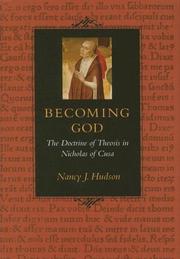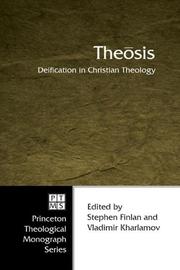| Listing 1 - 10 of 42 | << page >> |
Sort by
|

ISBN: 0813216125 9780813216126 0813214726 9780813214726 Year: 2007 Publisher: Washington, D.C. Catholic University of America Press
Abstract | Keywords | Export | Availability | Bookmark
 Loading...
Loading...Choose an application
- Reference Manager
- EndNote
- RefWorks (Direct export to RefWorks)
Book
ISBN: 9781978707269 Year: 2021 Publisher: Lanham, Maryland Lexington Books/Fortress Academic
Abstract | Keywords | Export | Availability | Bookmark
 Loading...
Loading...Choose an application
- Reference Manager
- EndNote
- RefWorks (Direct export to RefWorks)
Christians confess that Christ came to save us from sin and death. But what did he save us for? One beautiful and compelling answer to this question is that God saved us for union with him so that we might become "partakers of the divine nature" (1 Pet 2:4), what the Christian tradition has called "deification." This term refers to a particular vision of salvation which claims that God wants to share his own divine life with us, uniting us to himself and transforming us into his likeness. While often thought to be either a heretical notion or the provenance of Eastern Orthodoxy, this book shows that deification is an integral part of Catholicism, Orthodoxy, and many Protestant denominations. Drawing on the resources of their own Christian heritages, eleven scholars share the riches of their respective traditions on the doctrine of deification. In this book , scholars and pastor-scholars from diverse Christian expressions write for both a scholarly and lay audience about what God created us to be: adopted children of God who are called, even now, to "be filled with all the fullness of God" (Eph. 3:19). --
Book
ISBN: 9781108290852 110829085X 1108314015 1108311016 9781108418683 9781108406338 Year: 2024 Publisher: Cambridge Cambridge University Press
Abstract | Keywords | Export | Availability | Bookmark
 Loading...
Loading...Choose an application
- Reference Manager
- EndNote
- RefWorks (Direct export to RefWorks)
Theosis, originally a Greek term for Christian divinisation or deification, has become a vogue word in modern theology. Although recent publications have explored its meaning in a selection of different contexts, this is the first book to offer a coherent narrative of how the concept of theosis developed in both its Eastern and Western versions. Norman Russell shows how the role of Dionysius the Areopagite was pivotal, not only in Byzantium but also in the late mediaeval West, where it strengthened the turn towards an individualistic interiority. Russell also relates theosis to changing concepts of religion in the modern age. He investigates the Russian version of theosis, introduced in the West by Russian members the Paris School after the 1917 Revolution. Since then, theosis has undergone additional development through the addition of esoteric elements which have since passed into the mainstream of all theological traditions and even into popular spirituality.

ISBN: 1597524387 Year: 2006 Publisher: Eugene Pickwick
Abstract | Keywords | Export | Availability | Bookmark
 Loading...
Loading...Choose an application
- Reference Manager
- EndNote
- RefWorks (Direct export to RefWorks)
Deification (Christianity --- Sanctification --- -History of doctrines
Book
ISBN: 9780881413397 Year: 2009 Publisher: Crestwood St Vladimir's seminary press
Abstract | Keywords | Export | Availability | Bookmark
 Loading...
Loading...Choose an application
- Reference Manager
- EndNote
- RefWorks (Direct export to RefWorks)
Deification (Christianity) --- Orthodox Eastern Church --- Doctrines.
Book
ISBN: 9780190467166 0190467169 Year: 2016 Publisher: New York Oxford University Press
Abstract | Keywords | Export | Availability | Bookmark
 Loading...
Loading...Choose an application
- Reference Manager
- EndNote
- RefWorks (Direct export to RefWorks)
Apotheosis --- Judaism --- Deification (Christianity) --- God --- Doctrines
Book
ISBN: 9788893280174 8893280175 Year: 2017 Publisher: Crotone D'Ettoris editori
Abstract | Keywords | Export | Availability | Bookmark
 Loading...
Loading...Choose an application
- Reference Manager
- EndNote
- RefWorks (Direct export to RefWorks)
Deification (Christianity) --- History of doctrines --- Augustine,
Book
ISBN: 0813231434 Year: 2019 Publisher: Washington, District of Columbia : The Catholic University of America Press,
Abstract | Keywords | Export | Availability | Bookmark
 Loading...
Loading...Choose an application
- Reference Manager
- EndNote
- RefWorks (Direct export to RefWorks)
"Contributors to this volume refute the widely held perception that the doctrine of deification primarily belonged in the Eastern Church, and that the Western Church reduced the rich biblical and Greek patristic understanding of salvation to a narrow view of redemption. To the contrary, these essays provide evidence of the wide-ranging use of deification themes in major Latin patristic sources, showing that deification was a native part of early Latin theology that was consitently and creatively employed"--
Deification (Christianity) --- Christian literature, Early --- Latin authors --- History and criticism.
Book
ISBN: 9780802882769 0802877982 9780802877987 0802882765 Year: 2022 Publisher: Grand Rapids, Michigan William. B. Eerdmans Publishing Company
Abstract | Keywords | Export | Availability | Bookmark
 Loading...
Loading...Choose an application
- Reference Manager
- EndNote
- RefWorks (Direct export to RefWorks)
It is commonly claimed that Western Christianity teaches salvation as deliverance from sin through Jesus's sacrifice on the cross, while Eastern Christianity teaches salvation as deliverance from death--and as deification--through Christ's incarnation. But is it really true that no normative, unified doctrine of salvation is to be found in Scripture and tradition? Theologian Khaled Anatolios, deeply grounded in both East and West, here advances a soteriology that speaks deeply to all Christians. He argues that both Eastern and Western perspectives are needed, and especially that Eastern theology and liturgy--contrary to Western misperceptions--hold cross, resurrection, and glorification together in an exemplary way. Anatolios uses the phrase "doxological contrition" to suggest that the truth of salvation is found both in Jesus's perfect glorification of God and in his representative repentance for humanity's sinful rejection of its original calling to participate in the life of the Holy Trinity. Deification through the Cross is a salutary rebuttal of the postmodern fragmentation that assumes no single, normative soteriology can apply globally. Anatolios systematically expounds an integrated soteriology, which he then puts into dialogue with various perspectives, including liberation theology, Girardian theory, and penal substitution. All who seek to understand and teach "the joy of our salvation" will find indispensable help in this magisterial retrieval of an often-misunderstood doctrine.
Deification (Christianity) --- Salvation --- Christianity --- Orthodox Eastern Church --- Doctrines. --- Doctrines
Book
ISBN: 9781009392945 9781009392921 9781009392969 1009392956 1009392948 100939293X Year: 2024 Publisher: Cambridge, England : Cambridge University Press,
Abstract | Keywords | Export | Availability | Bookmark
 Loading...
Loading...Choose an application
- Reference Manager
- EndNote
- RefWorks (Direct export to RefWorks)
To be human is to strive to be better, and we cannot be better without knowing what is best. In ancient Greek philosophy and the Bible, what is best is god. Plato and Aristotle argue that the goal of human life is to become as much like god as is humanly possible. Despite its obvious importance, this theme of assimilation to god has been neglected in Anglo-American scholarship. Classical Greek philosophy is best understood as a religious quest for divinity by means of rational discipline. By showing how Greek philosophy grows out of ancient Greek religion and how the philosophical quest for god compares to the biblical quest, we see Plato and Aristotle properly as major religious thinkers. In their shared quest for divine perfection, Greek philosophy and the Bible have enough in common to make their differences deeply illuminating.
Deification (Christianity) --- Philosophical anthropology. --- Philosophy, Ancient. --- Theological anthropology --- Biblical teaching.
| Listing 1 - 10 of 42 | << page >> |
Sort by
|

 Search
Search Feedback
Feedback About UniCat
About UniCat  Help
Help News
News